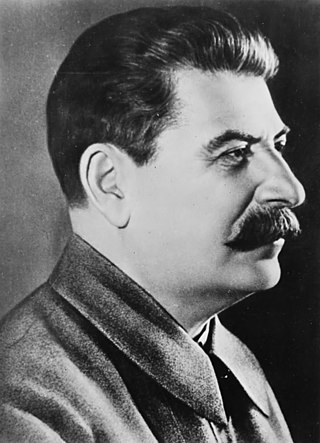| |||||
| Decades: | |||||
|---|---|---|---|---|---|
| See also: | |||||
The following lists events that happened during 1951 in the Union of Soviet Socialist Republics .
| |||||
| Decades: | |||||
|---|---|---|---|---|---|
| See also: | |||||
The following lists events that happened during 1951 in the Union of Soviet Socialist Republics .

The General Secretary of the Central Committee of the Communist Party of the Soviet Union was the leader of the Communist Party of the Soviet Union (CPSU). From 1924 until the union's dissolution in 1991, the officeholder was the recognized leader of the Soviet Union. Officially, the General Secretary solely controlled the Communist Party directly. However, since the party had a monopoly on political power, the General Secretary de facto had executive control of the Soviet government. Because of the office's ability to direct both the foreign and domestic policies of the state and preeminence over the Soviet Communist Party, it was the de facto highest office of the Soviet Union.

Nikolai Mikhailovich Shvernik was a Soviet politician who served as the Chairman of the Presidium of the Supreme Soviet from 19 March 1946 until 15 March 1953. Though the titular Soviet head of state, Shvernik had less power than Joseph Stalin as Chairman of the Council of Ministers of the Soviet Union.
The following lists events that happened during 1933 in the Union of Soviet Socialist Republics.
Nuritdin Akramovich Mukhitdinov was a Soviet politician. Between 1957 and 1961 he was a member of the Presidium of the Central Committee of the Communist Party of the Soviet Union, significantly contributing to its relations with the Soviet republics and foreign countries in Asia. He was also the Soviet ambassador to Syria between 1968 and 1977.

The Premier of the Soviet Union was the head of government of the Union of Soviet Socialist Republics (USSR). Twelve individuals held the post. Among the most known are Vladimir Lenin and Joseph Stalin.
Economic Problems of Socialism in the USSR is a work of political economy written by Joseph Stalin in 1951. It was one of the last works published before his death. In it, he made the claim that the Soviet Union had reached the lower stage of communism. The main impetus for the book came from the discussions around the preparations for a new textbook on political economy that would be standard throughout the communist movement. One of the main theoretical debates was on whether the law of value still operated within a socialist economy; some economists stated that Karl Marx in Das Kapital had only meant for it to apply to capitalist exchange. Stalin insisted that it still operated under a socialist economy. Nonetheless, he argued that it was a historical and not eternal law and that it would disappear in the second higher stage of communism. Under socialism, it was necessary for commodity exchange and trained "business executives to conduct production on rational lines and disciplines them". Stalin laid the book out as plan for the transition to full communism but insisted that objective economic laws would still have to be followed.
The following lists events that happened during 1942 in the Union of Soviet Socialist Republics.
The following lists events that happened during 1943 in the Union of Soviet Socialist Republics.
The following lists events that happened during 1944 in the Union of Soviet Socialist Republics.
The following lists events that happened during 1946 in the Union of Soviet Socialist Republics.
The following lists events that happened during 1947 in the Union of Soviet Socialist Republics.
The following lists events that happened during 1948 in the Union of Soviet Socialist Republics.
The following lists events that happened during 1949 in the Union of Soviet Socialist Republics.
The following lists events that happened during 1926 in the Union of Soviet Socialist Republics.
The following lists events that happened during 1927 in the Union of Soviet Socialist Republics.
The following lists events that happened during 1932 in the Union of Soviet Socialist Republics.
The following lists events that happened during 1950 in the Union of Soviet Socialist Republics.
The following lists events that happened during 1953 in the Union of Soviet Socialist Republics.

Joseph Stalin, second leader of the Soviet Union, died on 5 March 1953 at his Kuntsevo Dacha after suffering a stroke, at age 74. He was given a state funeral in Moscow on 9 March, with four days of national mourning declared. On the day of the funeral, hundreds or thousands of Soviet citizens visiting the capital to pay their respects died in a human crush.